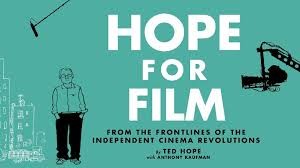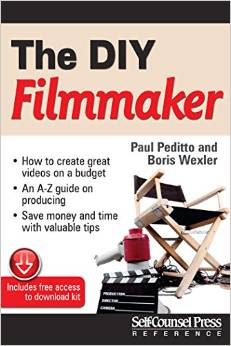Here are some screenwriting links that concentrate on a well-worn theme here at Script Gods–trying to find a way to make your damn script HAPPEN! I know, you’re seriously tired of my ad nauseam speeches on the virtues of micro-budget. I don’t mean to proselytize, but honestly, what other option is there? To go the Studio or Indie? The minute you need OPM, Other People’s Money, to the tune of millions is the minute you become a slave to query letters and screenwriting contests. I go into more detail on this in my new book, but for those of you not buying into living in L.A. or making it happen Old School-style, let me guide you toward an article or two that might help you along on your own Micro-journey.
- HACKING KICKSTARTER
 Many thanks to my student Brian C. for turning me onto this article written by Tim Ferriss, taken from his blog. When you look at the title. “Hacking Kickstarter: How to raise $100,000 in 10 days“, you roll your eyes. Yeah, right dude. But dig deeper into his strategies and you see there’s an almost scientific method to his madness. Tim details strategies for supercharging your Kickstarter campaign, how to tap into a much wider niche of potential donors for your Kickstarter campaign. “This post includes all of their email templates, spreadsheets, open-source code to build landing pages, and even a custom dashboard to monitor Kickstarter data, social media, and press.” I’ve written about Kickstarter strategies before, but this article puts me to shame. Really good stuff.
Many thanks to my student Brian C. for turning me onto this article written by Tim Ferriss, taken from his blog. When you look at the title. “Hacking Kickstarter: How to raise $100,000 in 10 days“, you roll your eyes. Yeah, right dude. But dig deeper into his strategies and you see there’s an almost scientific method to his madness. Tim details strategies for supercharging your Kickstarter campaign, how to tap into a much wider niche of potential donors for your Kickstarter campaign. “This post includes all of their email templates, spreadsheets, open-source code to build landing pages, and even a custom dashboard to monitor Kickstarter data, social media, and press.” I’ve written about Kickstarter strategies before, but this article puts me to shame. Really good stuff.
- DISTRIBUTION CASE STUDY MASTER LIST
 On the short list for best micro-budget websites is the Ted Hope blog. Ted Hope deserves the Nobel Prize for work advancing the field of micro-budget filmmaking. This must-read site has twenty articles I could recommend, but today let’s focus on this one. He’s done something I’ve not seen elsewhere, compiling a distribution case study master list. Think about it–you hear about micro-budget features and their digital distribution strategies. Lots of bells and whistle hype has lead up to the myriad of digital platforms now available to today’s art house writers, directors, and producers. But…. You never really hear how any of these movies actually DID, do you? I mean how much money they brought in. For all the talk about the viability of digital platforms–ARE THEY? Is there enough money coming in to actually make it a viable option? If I spend $25,000 on my micro, what are my chances of seeing ANY money back? What are the chances of breaking even, or making a profit? This list tracks dozens of movie that were made and released. What was their experience? What can be learned? You can find it here.
On the short list for best micro-budget websites is the Ted Hope blog. Ted Hope deserves the Nobel Prize for work advancing the field of micro-budget filmmaking. This must-read site has twenty articles I could recommend, but today let’s focus on this one. He’s done something I’ve not seen elsewhere, compiling a distribution case study master list. Think about it–you hear about micro-budget features and their digital distribution strategies. Lots of bells and whistle hype has lead up to the myriad of digital platforms now available to today’s art house writers, directors, and producers. But…. You never really hear how any of these movies actually DID, do you? I mean how much money they brought in. For all the talk about the viability of digital platforms–ARE THEY? Is there enough money coming in to actually make it a viable option? If I spend $25,000 on my micro, what are my chances of seeing ANY money back? What are the chances of breaking even, or making a profit? This list tracks dozens of movie that were made and released. What was their experience? What can be learned? You can find it here.
- HOW SOCIAL MEDIA IS SAVING THE FILM INDUSTRY
 I’m a sucker for infographics, it’s true. Many thanks to Mashable for reprinting this Allmand Law chart on how social media and viral marketing are being used in the new paradigm of digital filmmaking.
I’m a sucker for infographics, it’s true. Many thanks to Mashable for reprinting this Allmand Law chart on how social media and viral marketing are being used in the new paradigm of digital filmmaking.
“An infographic by law firm Allmand Law reveals how Hollywood is using social media and viral marketing to compensate for declining ticket sales. For example, cloud computing — when combined with digital films — saves the industry money on shipping costs by eliminating the need to transport physical copies of films between studios, theaters, distributors or advertisers. What’s more, the movie business is no longer exclusively in the business of movies, with tie-in products such as video games and toys generating profits for studios. Viral marketing has also proven to be a useful tool for filling theater seats. For example, a flight-safety video promoting Peter Jackson’s The Hobbit: An Unexpected Journey garnered around 2 million views before its release.”
- TIPS FROM A FORMER FESTIVAL PROGRAMMER
 Another good one is this article from ThinkTen Media Group entitled: Getting Started and Getting Better– Filmmaking Tips From An Indie Filmmaker and Former Festival Programmer. From the article: “Recently, Think Ten Media Group Co-Founder and Indie Film Producer Jennifer Fischer (AKA @IndieJenFischer) was interviewed… This post pulls from 10 years of experience as an independent filmmaker, 7 years of experience running a film festival and 5 years of teaching filmmaking classes with kids.” OK sure, I’m pretty sure you’re not a kid any more, Good Reader. Still, some solid links and basic advice, found here.
Another good one is this article from ThinkTen Media Group entitled: Getting Started and Getting Better– Filmmaking Tips From An Indie Filmmaker and Former Festival Programmer. From the article: “Recently, Think Ten Media Group Co-Founder and Indie Film Producer Jennifer Fischer (AKA @IndieJenFischer) was interviewed… This post pulls from 10 years of experience as an independent filmmaker, 7 years of experience running a film festival and 5 years of teaching filmmaking classes with kids.” OK sure, I’m pretty sure you’re not a kid any more, Good Reader. Still, some solid links and basic advice, found here.
- 15 TIPS ON MAKING YOUR FIRST MICRO-BUDGET FILM
 On Wall Street you buy the rumor and sell the news. Seeing Josh Overbay on Indiewire was “the news”. I already knew this guy was a filmmaker at his core. When did I know that? Probably when the script for As It Is In Heaven, the movie written about here, came into Script Gods Must Die. It’s not a cliche–you know a good script when you read it–page 1. So it didn’t surprise me to hear Josh had a short New York run for his movie. If you want to know how hard it is for a no-name actor micro-budget to show on an actual screen in New York City, consider this… for the 1000+ students I’ve had in my decade+ teaching, only two made a New York screen. And Josh was one of them. So listen up to this list of tips he compiled for Indiewire. And go and do likewise!
On Wall Street you buy the rumor and sell the news. Seeing Josh Overbay on Indiewire was “the news”. I already knew this guy was a filmmaker at his core. When did I know that? Probably when the script for As It Is In Heaven, the movie written about here, came into Script Gods Must Die. It’s not a cliche–you know a good script when you read it–page 1. So it didn’t surprise me to hear Josh had a short New York run for his movie. If you want to know how hard it is for a no-name actor micro-budget to show on an actual screen in New York City, consider this… for the 1000+ students I’ve had in my decade+ teaching, only two made a New York screen. And Josh was one of them. So listen up to this list of tips he compiled for Indiewire. And go and do likewise!



